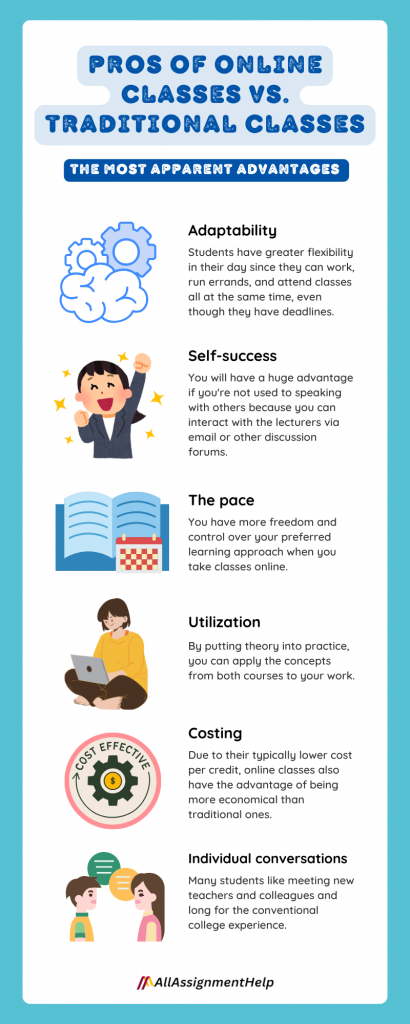Table of Contents
Technology has taken over everything, and education is no exception. The argument over online classes vs traditional education is getting more and more attention, particularly in the wake of the COVID-19 pandemic.
All of the learning activities had to take place online due to a worldwide pandemic. You could be wondering, which type of learning is best for you since everyone who participated in online learning at this time had a distinct experience. This blog, written by an expert at AllAssignmentHelp will help explore the differences, similarities, and more associated with online classes and traditional classes and eventually help students get the right path for education.
Online Classes vs. Traditional Education – What is the Difference?
To know the difference in a crystal-clear manner about the basic differences between these two, we need to have some ideas.
Let’s see these below:
The term “online learning” refers to a form of remote learning that takes place over the Internet. On the contrary, traditional classes take place in a classroom environment, with an instructor imparting knowledge on a predetermined subject. Nevertheless, there are distinctions between these two strategies.
Through text, photos, or videos, the material is delivered to students via the online platform. Although there is little interaction, the instruction can be scheduled for any time. Traditional education, on the other hand, follows a set timetable and location. Because this type of learning allows students to work or participate in activities in various groups, there is an increased amount of social interaction.
A Forbes study found that over 75% of academic leaders believe that online learning is either superior to or on par with traditional classroom instruction. It makes sense why. Since online courses are more convenient and accessible, especially for those who have other commitments or a full-time job, many students have profited from them.
Are you also into online education? Great! Often students are not able to handle the pressure of academics even in the case of online learning. Writing assignments is a huge work where students often suffer a lot and lose marks. This is where they can take advantage of professional college assignment help providers. They can take care of any sort of assignment irrespective of their size and criticalness. Weathered assignment doers will make sure to help you attain high scores in your assignments all the time you hire them.
Read more: How Online Classes Have Proven Its Worth Over Conventional Classes?
Pros of Online Classes vs. Traditional Classes
Your learning style and timetable need to be considered when comparing the benefits and drawbacks of online versus traditional classes.

Following are some of the most apparent advantages of these two approaches are listed below:
Adaptability
Flexibility is among the biggest benefits of taking classes online. Students have greater flexibility in their day since they can work, run errands, and attend classes all at the same time, even though they have deadlines. Additionally, they have the freedom to decide when they want to study, complete homework, attend lectures, etc. This also enables students to finish the assignments at their own pace and log into the course whenever they choose.
Since students must physically attend classes, traditional learning environments are less flexible. While this results in a more rigid schedule, there are some accommodating choices available, such as enrolling in a college or institution that lets you design your own schedule.
Self-Success
Both strategies offer benefits in terms of learning styles. Students can work independently without interacting with peers or teachers when they learn online. For kids who struggle with social anxiety or who learn best on their own, this is perfect.
You are in an advantageous position if you’re not used to speaking with others because you can interact with the lecturers via email or other discussion forums.
The ability for professors to allocate students to work in groups, in pairs, or alone makes traditional learning advantageous as well. You may always learn from and alongside other students. But since you’ll be in school all day, you’ll undoubtedly meet new professors and students and pick up social and independent skills.
The pace
You have more freedom and control over your preferred learning approach when you take classes online. Adjust your pace to suit your demands if you work long hours and are busy. Students are free to read and work on the tasks at their leisure throughout that period, without any interruptions. They can also take two classes at once or one class at a time.
Because you have to be consistent and attend classes according to the prescribed timetable, traditional classes are less flexible than online schools. If, however, you find it difficult to keep up in an online course, traditional learning may be a better option. You might be able to take your classes at night, depending on the kind of instructor and classroom you are in.
In case you are unwell and not sure whether will be able to attend your online class, you might be thinking I want to pay someone to take my online class for me. You certainly can do that! Online class takers are available round the clock to take you out of such a stern situation and help you save important marks associated with the class. Be it any class, just write on Google and get a professional to do it for you at a highly pocket-friendly cost.
Utilization
It’s not always easy to put what you study in traditional or online education into practice. Because of their abilities and expertise, many students are able to secure employment before completing their degree. Nonetheless, by putting theory into practice, you can apply the concepts from both courses to your work.
Costing
Due to their typically lower cost per credit, online classes also have the advantage of being more economical than traditional ones. The teacher doesn’t have to work a full-time job in order to teach the class, which results in a lower cost. Simultaneously, an increasing number of online courses are available at the same price as a typical school or college education.
While traditional education has its value, it is also costly. Because they don’t require extra expenses for things like training facilities, printed materials, or employing an instructor, online classes are more economical. Therefore, when we see online vs traditional education costs, online classes or online ways of study are way more cost-effective and thus, preferred by many students.
Individual Conversations
Many students like meeting new teachers and colleagues and long for the conventional college experience. As a social learner, you will benefit from one-on-one interactions in a traditional classroom setting.
The main misconception regarding online learning is that it doesn’t require any form of communication. In actuality, you can still communicate with your lecturers and fellow students because they are physically present in front of you. Online courses make use of additional tools like Blackboard and video tools to improve student discussion, brainstorming, and communication.
There are several pros related to online studying and once you opt for it, you can surely get much help from various internet resources.
Read more: Role of Online Classes in Career Advancement and Upskilling
Cons of Online Classes vs. Traditional Classes
It may take some getting used to taking classes online if you’ve never done so before or if you’ve just started.
Some typical drawbacks are to be expected, which are detailed below:
Reduced Coordination
Social connection in online classes is lacking, at least from a conventional standpoint. Even though you are unable to attend office hours or have conversations with your peers in the corridor, you are still able to communicate digitally.
You can still communicate with your professors and students in most online classrooms since they use group projects, livestreaming, video chat (Zoom or Google Meet), and other methods.
In many cases, it has been observed that due to limited coordination, students are hesitant to talk to their professors about an issue that they have with a particular subject or topic. This issue can become very serious when they have an online exam in it and they feel highly scared. It is always preferred to sort issues out instantly. However, if you have an exam in a day and are not able to sort out a specific issue with your instructor, instead of getting perplexed, write Take my online exam for me on Google to find top-notch online exam experts to get instant help and relief. They can take your exam on behalf of you and help you save important grades in it.
Engagement
Two advantages of traditional classes are growing your professional network and gaining practical experience. Sadly, there are fewer networking chances when you attend online courses, which puts you at a disadvantage.
If so, you will have to invest a significant amount of time and energy in searching for online universities that offer mentorship programs, let you connect with groups for professionals, and have a robust employer network.
Optimism
Given that every learner is unique, motivation is one of the most contentious drawbacks of these two methods of instruction. While some people appreciate online deadlines, others find that in-person meetings are more motivating for them. Many students find that they are more driven to finish jobs or assignments when they are in the company of classmates and teachers.
Setting personal deadlines might help you stay more motivated and prevent you from putting things off until the last minute. Another way to establish a private online learning environment is to eliminate any unnecessary distractions.
Being focused
In a classroom full of students and your teacher, it’s simple to maintain concentration, but what about online learning? If you are preoccupied with anything else or have other priorities, you are more likely to become side-tracked when studying remotely. Once more, we advise designating a specific area to get rid of any distractions, so take down your phone, TV, and anything else that could divert your attention from your studies.
The cons discussed are quite practical in nature and can give students a tough thought. It is a must for students to think which way they want to pursue their higher education. Once they are clear with this answer, it will be way easier for them to select between the online and traditional courses.
Read more: Which One is The Best Master’s Degree – MBA or M.Tech?
Conclusion
You should be aware that a variety of factors can affect the setting for learning in both traditional and online programs. Usually, it comes down to your priorities and degree of classroom flexibility.
The final decision is yours and will rely on your tastes; however, keep in mind that each learning strategy has advantages and disadvantages, so balance them evenly. When it comes to online vs. traditional schooling, there is no right or wrong answer.
Frequently Asked Questions
| Question 1: What are the key differences between online learning and traditional learning? Answer: Online education can be more flexible, accessible, and individualized than in-person instruction, but it also calls for a high level of self-discipline and may not provide face-to-face connection. On the other hand, an organized learning environment and active engagement are promoted by traditional learning. |
| Question 2: Is online study good or bad? Answer: You can complete the coursework at your own pace, as you see fit, and in a method that best fits your learning style with online classes. One of the main advantages of taking lessons online is that you can learn at your own pace, giving you complete control over the process. |
| Question 3: What is the conclusion of online education? Answer: The emergence of online learning has revolutionized the field of education, presenting both new opportunities and difficulties for conventional educational establishments. Access to education has been democratized by online learning, which has increased affordability, flexibility, and accessibility. |
